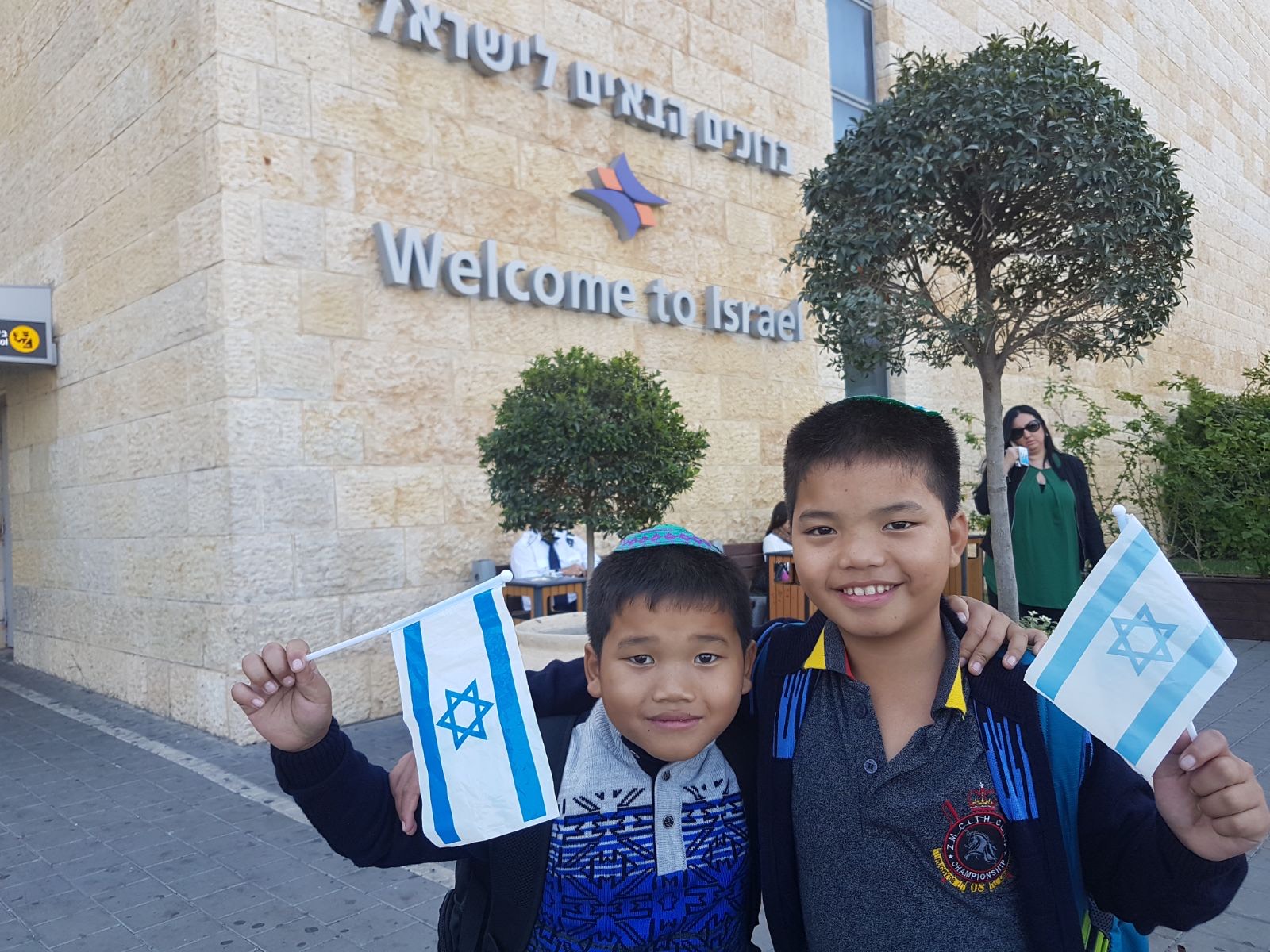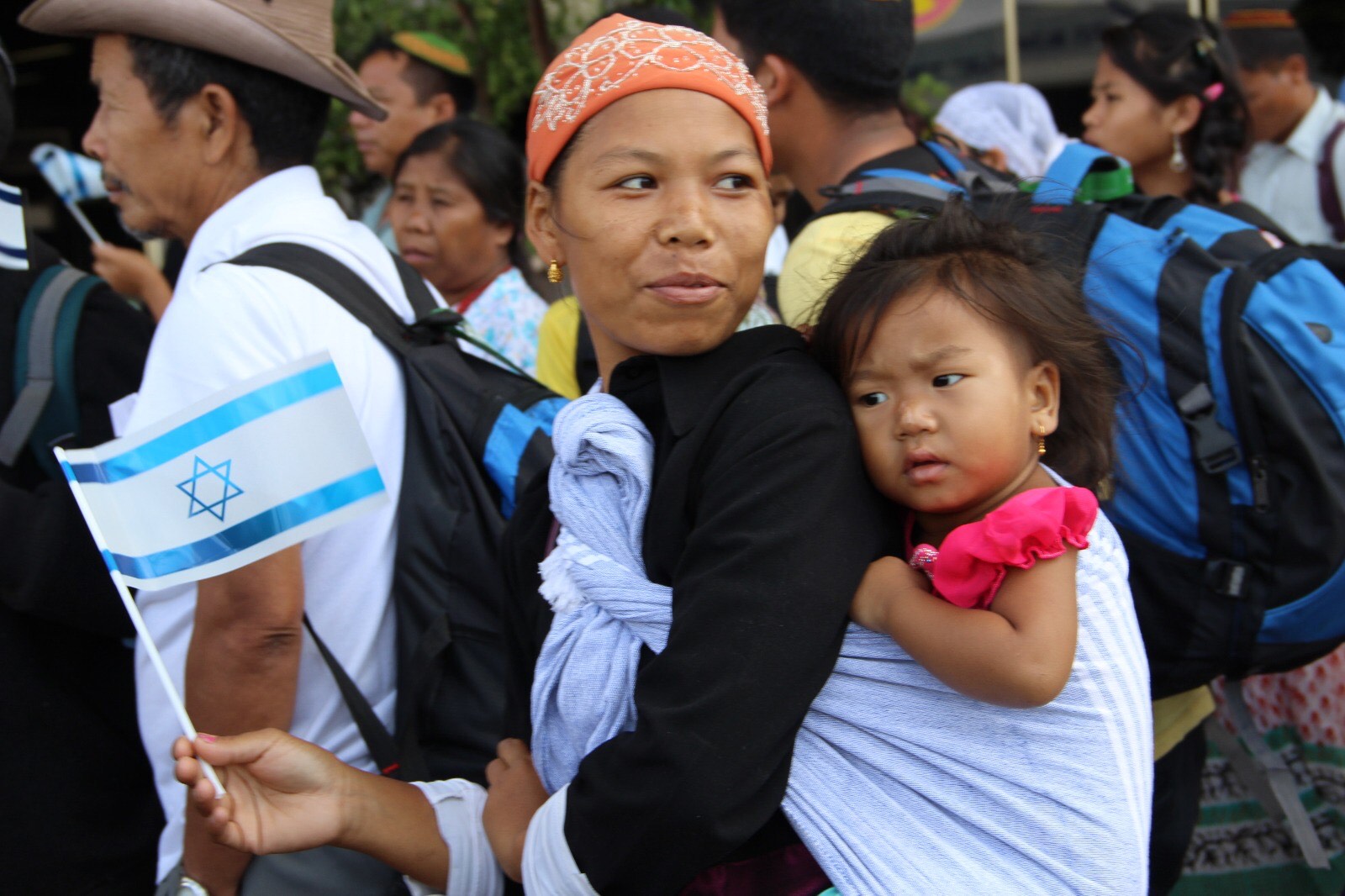Approval of Mass Aliyah From India Fulfills Bnei Menashe’s 2,700-Year-Old Dream
The Bnei Menashe are considered one of two lost tribes discovered in modern times, along with the Ethiopian Jews, believed to be descendants of the Tribe of Dan
Hanoch Haokip, an Israeli immigrant from the Bnei Menashe community of northeast India, has returned to his home country—not to stay, but to help prepare the next group of Bnei Menashe who are finally preparing to move to Israel.
“They are very excited, very emotional,” Haokip, who works for the Shavei Israel NGO, told The Media Line in a phone interview Monday morning. “They have been waiting for many years to make Aliyah. They are very happy.”
Shavei is a non-profit organization helping descendants of Jews, and the Lost Tribes of Israel reclaim their roots and return to the Jewish people.

Bnei Menashe making aliyah. (Courtesy: Shavei Israel)
Haokip is one of roughly 4,000 Bnei Menashe who have immigrated to Israel over the past two decades. He arrived in 2013 with his wife and two daughters and has since welcomed two more daughters born in Israel. His eldest daughter served in the IDF during the October 7 war.
We work, and we are in the army, the yeshivas; we are everywhere, every part of life. We do our best to serve the country and the God of Israel and will continue to do whatever it takes for the betterment of Israel.
“Our community does its best to contribute to society,” he said. “We work, and we are in the army, the yeshivas; we are everywhere, every part of life. We do our best to serve the country and the God of Israel and will continue to do whatever it takes for the betterment of Israel.”
Haokip spoke to The Media Line the day after the government approved a comprehensive plan to complete the aliyah of the Bnei Menashe community from the Indian states of Mizoram and Manipur, home to the Kuki, Chin and Mizo tribes. The approval came on Sunday after years of advocacy from community leaders and organizations working on their behalf.
Under the plan, approximately 1,200 community members are expected to immigrate to Israel by the end of 2026. A second stage, slated for completion by 2030, will bring an additional 4,600 people, effectively completing the aliyah of the entire community.
The first wave is expected to cost Israel around 90 million shekels, covering immigration logistics, conversion, housing in absorption centers, integration benefits, Hebrew-language studies, and placement into education and employment frameworks.
The new immigrants will be settled in northern Israel as part of a broader government strategy to strengthen and develop the Galilee and the North.
“This is an important Zionist decision that reconnects hearts and families,” Finance Minister Bezalel Smotrich said after the decision passed. “Completing the aliyah of the Bnei Menashe is a renewed bond with brothers who have carried a longing for Zion in their hearts for generations. Their aliyah to the Galilee and settlement in Nof HaGalil strengthens our hold in the north and the future of the State of Israel.”
Minister of Aliyah and Integration Ofir Sofer added that “this aliyah joins the blessed wave of immigration we have seen in the past two years from many diasporas, an aliyah that strengthens Israel’s resilience, solidarity, and renewal.”
Freund has been in touch with members of the Bnei Menashe community since the late 1990s.
Give the gift of hope
We practice what we preach:
accurate, fearless journalism. But we can't do it alone.
- On the ground in Gaza, Syria, Israel, Egypt, Pakistan, and more
- Our program trained more than 100 journalists
- Calling out fake news and reporting real facts
- On the ground in Gaza, Syria, Israel, Egypt, Pakistan, and more
- Our program trained more than 100 journalists
- Calling out fake news and reporting real facts
Join us.
Support The Media Line. Save democracy.


“This is a historic decision by the Israeli government,” he told The Media Line, “something that we have been praying for, lobbying for, for 20 years. Now, at last, it is coming to pass.”
According to Freund, the first person to bring the story of the Bnei Menashe to the public was Rabbi Eliyahu Avichail, who founded the organization Amishav in 1975 to find lost tribes and reconnect them with Israel. He began visiting the Bnei Menashe in the 1980s to teach Jewish customs and liturgy and is credited with giving the community its name.

Bnei Menashe making aliyah. (Courtesy: Shavei Israel)
Freund first encountered their story in the spring of 1997, when he was working in the office of Prime Minister Benjamin Netanyahu serving as deputy communications director during his first term. A letter from the leaders of the Bnei Menashe community, which he had never heard of, landed on his desk. The letter, he recalled, was an appeal to the Israeli government to allow them to return to Zion as descendants of the lost tribe of Menashe.
“My initial reaction was that this was crazy,” Freund admitted. “I did not believe it. However, the letter was very heartfelt. So, I chose to answer it.”
What he discovered next surprised him: the Bnei Menashe had written similar letters to every prime minister since at least Golda Meir, who had served from 1969 to 1974. Soon afterward, Freund met members of the community and learned about their deep, sincere desire to join the Jewish people. This meeting ultimately drew him into helping their aliyah himself.
After Netanyahu left office in 1999, Freund joined Amishav and later founded his own organization, Shavei Israel. He told The Media Line that the aliyah process had experienced ups and downs over the years, fluctuating with shifting governments and the situation in Israel, but that Shavei managed to bring small groups almost every year.
“Over the past decade, it began to gain steam,” Freund said. “The government saw the Bnei Menashe as quality immigrants who are dedicated to the country, who work hard, support themselves and their families, raise beautiful Jewish children, and serve in the army and volunteer in combat units. They are truly a blessing for Israel and the Jewish people.”
Although the Bnei Menashe live Jewish lives before arriving, they undergo a conversion process in Israel to remove any halachic doubt. Freund said most community members are young and come from the Indian states of Manipur and Mizoram, near Burma and Bangladesh. The younger generation, in particular, speaks English, has at least a high-school education, and is technologically literate.
“They are in touch and connected to Israeli society,” Freund said. “The transition they face is not as dramatic as perhaps some immigrant groups … They are also well equipped in terms of their determination and resilience and their desire to fulfill the dream of their ancestors and make aliyah.”
They are in touch and connected to Israeli society. The transition they face is not as dramatic as perhaps some immigrant groups.
Freund noted that this plan had been in the works before October 7, 2023, but the war paused the process. There has not been a substantial aliyah of Bnei Menashe since 2021.
The Bnei Menashe trace their origins back 27 centuries, to the period when the Assyrian Empire ruled the region.
After the death of King Solomon, the people of Israel split into two kingdoms: the northern kingdom of the ten tribes and the southern kingdom of Judah. The Assyrians conquered the northern kingdom and sent its inhabitants into exile, though their attempt to capture Jerusalem ultimately failed.
About 140 years later, the Babylonians invaded, destroyed the First Temple, and exiled the Jews to Babylon. Roughly 70 years after that, some Jews returned to Jerusalem. The ten tribes, however, were believed to have disappeared into history. But, as Freund noted, “no one is ever lost in God’s eyes,” and the prophets spoke of a future day when the ten tribes would return from exile to the land of Israel.

Bnei Menashe making aliyah. (Courtesy: Shavei Israel)
Centuries later, in 70 CE, the Romans destroyed the Second Temple and scattered the remaining Jews across the world.
The Bnei Menashe are distinct from Judeans, Levites, and Cohanim. Their ancestors were exiled long before the Roman dispersion, making their story one of extraordinary perseverance. Across generations, they continued to practice Judaism to the best of their ability, even if not in a contemporary Orthodox way. Once they came into contact with Israel and global Jewry in the 1980s, they embraced modern Jewish learning and practice.
The Bnei Menashe are considered one of two lost tribes discovered in modern times, along with the Ethiopian Jews, believed to be descendants of the Tribe of Dan. If so, eight tribes remain unaccounted for.
This is a remarkable story of Zionism, and it underlines the importance of the State of Israel as a place where even Jews who have been cut off from the rest of our people for so long are nonetheless still able to find their way back
“This is the fulfilment of a dream that began 2,700 years ago when the ten tribes were cast into exile, and incredibly enough, we are now witnesses to the beginning of their return,” Freund told The Media Line. “This is a remarkable story of Zionism, and it underlines the importance of the State of Israel as a place where even Jews who have been cut off from the rest of our people for so long are nonetheless still able to find their way back.”
A first delegation of Israelis is expected to depart for India within a week, according to the government. The group will include representatives from the Chief Rabbinate, the Conversion Authority, the Ministry of Aliyah and Integration, the Population and Immigration Authority, the Ministry of Foreign Affairs, and the Jewish Agency. After the Sephardi Chief Rabbi approves the community lists, the immigrants will enter Israel with A/5 residency visas.
“The selection process is very serious, and everybody is preparing hard for it,” Haokip said.
Freund added, “This is like a dream come true.”

